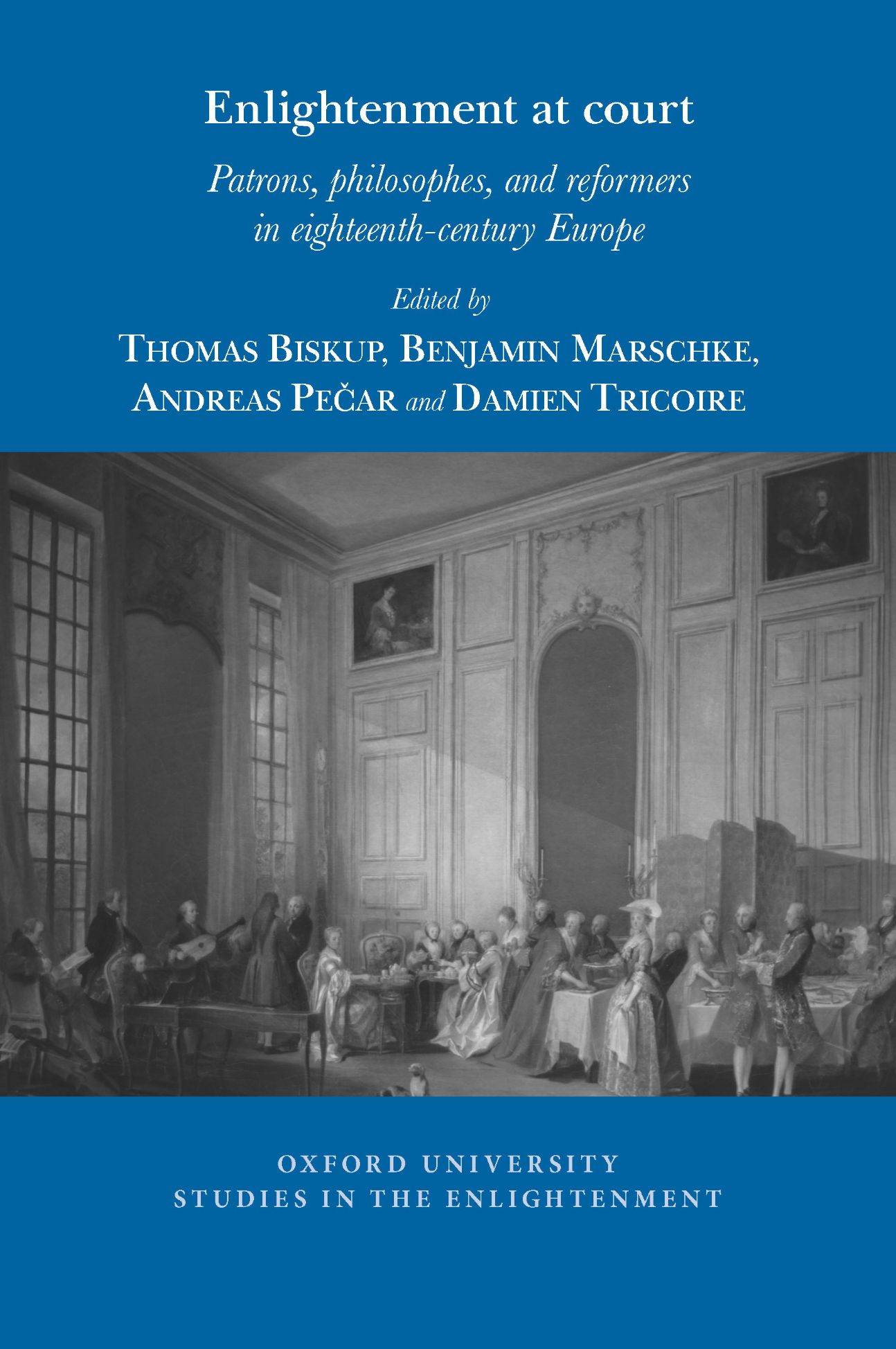
Enlightenment at court: Patrons, philosophes and reformers in eighteenth-century Europe
Edited by Thomas Biskup, Benjamin Marschke, Andreas Pečar and Damien Tricoire
Oxford University Studies in the Enlightenment
This is the first comprehensive analysis of the royal and princely courts of Europe as important places of Enlightenment. Covering a wide geographical scope, the book’s contributions discuss patronage relations, consider the court as an audience, and analyse the role of Enlightenment writers for royal image-making and reform policies.
- Fascinating new perspectives on the roles of philosophes and Aufklärer courtly networks, and on the uses of Enlightenment writings in court politics.
- Comprehensive survey of European countries from Spain and France to Russia, and from Scandinavia and Britain to the Holy Roman Empire.
- Innovative methodology and sources hitherto not considered in this context, such as garden design, anonymous pamphlets, and Russian drama.
***
Table of Contents
List of illustrations
Acknowledgements
Introduction: Court and Enlightenment, Thomas Biskup, Benjamin Marschke, Andreas Pečar, Damien Tricoire
Part one: Courtly Patronage
Diderot the Courtier? Philosophers and the World of the Court in Enlightenment Europe, Andreas Pečar & Damien Tricoire
Celebrity, Status, and Gender at the late Hanoverian Court: The Careers of Charles Burney (1726-1814) and Frances Burney (1752-1840), Clarissa Campbell Orr
Part two: Public sphere
“Hey France, Your Coffee is F***ing Off!” or How to interpret Unauthorized Literature in Late Ancien Régime France? Courtly Patronage and the So-Called “Mairobert corpus” (1774-1777), Damien Tricoire
Music, Taste, and Enlightenment Discourse at the Prussian Court. The Marpurg-Agricola Controversy over the Relative Merits of the French and Italian Styles, Tal Soker
Part three: Self-representation
What Makes Enlightenment Princes Enlightened? The Representation of Franz of Anhalt-Dessau and Frederick August of Anhalt-Zerbst,Paul Beckus
Enlightenment in Courtly Garden Art—Enlightenment Ideas and Anti-Court Sociability in the Sanspareil Rock Garden of Wilhelmine of Bayreuth, Luise Maslow
Clemency in the Boudoir. Favoritism and Imperial Virtues at the Russian Court (1740s-1790s), Alexei Evstratov
Fraternal Kingdom? Freemasonry at the Court of Gustav III of Sweden (1772-1792), Andreas Önnerfors
Part four: Projects and reforms
Sovereignty and the Politics of Knowledge. Royal Society, Leibniz, Wolff, and Peter the Great’s Academy of Sciences, Kirill Ospovat
Continuity and Change in Courtly and Enlightenment Discourse on Education in Spain. Gaspar Melchor de Jovellanos and the Moral Regeneration of the Nobility, Gijs Versteegen
The King is Dead—Long Live the Enlightenment? Viennese Court Culture, Networks, and Enlightened Reforms in Periods of Transition (1765-1795), Simon Karstens
Bibliography
Index
***
Thomas Biskup has been teaching and researching Early Modern History at Oxford, Wolfenbüttel, Princeton, and Hull. His main fields of research are the political culture of seventeenth- to nineteenth-century Europe, and the intersection of politics and science in the Atlantic world.
Benjamin Marschke teaches European history at Cal Poly Humboldt, in California. He is currently working on a monograph about political ceremony, gender/sexuality, luxury/money/work ethic, and intellectual/academic culture in the early eighteenth century, focusing on King Frederick William I of Prussia (1713-1740).
Andreas Pečar teaches Early Modern History at Martin Luther University Halle-Wittenberg. He is Chair of the ‘Enlightenment—Religion—Knowledge’ research cluster and President of the Historical Society of Saxony-Anhalt.
Damien Tricoire teaches Early Modern History at the University of Trier. His main fields of research are religion and politics, colonial policy, knowledge and intellectual history in the 17th and 18th centuries. He is currently working on a monograph on Enlightenment history and leading an ERC-funded research project on the impact of aristocratic patronage on the public sphere and politics in 18th-century France.
***
The Oxford University Studies in the Enlightenment series, previously known as SVEC (Studies on Voltaire and the Eighteenth Century), has published over 500 peer-reviewed scholarly volumes since 1955 as part of the Voltaire Foundation at the University of Oxford. International in focus, Oxford University Studies in the Enlightenment volumes cover wide-ranging aspects of the eighteenth century and the Enlightenment, from gender studies to political theory, and from economics to visual arts and music, and are published in English or French.